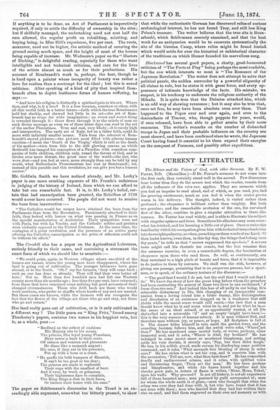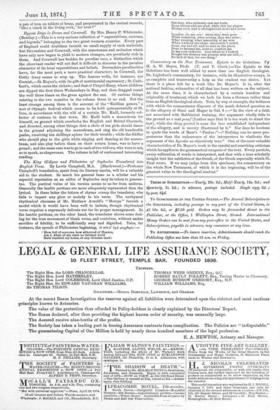CURRENT LITERATURE.
The Silence and the Voices of God, with other Sermons. By F. W. Farrar, D.D. (Macmillan.)—If Dr. Farrar's sermons do not come into' the first rank, they certainly stand well in the second. Few discourses. bear better than they do the severe test which the reader, remote from all the influence of the viva vox, applies. They are sermons which, you feel an impulse to read aloud, and of which, as you read, you feel-
the growing excitement, much as you feel it when the orator grows warm in his delivery. The thought, indeed, is varied rather than profound ; the eloquence is brilliant rather than weighty. But both.
are genuine ; and the remarkable profusion of the one, the sus'ained flow of the other, combine to give a singular attraction to these dis- courses. Dr. Farrar has read widely, and is able to illustrate his subject with singular aptness and force. Sometimes his allusions may seem some- what far-fetched, and his learning a little out of place. Once or twice the familiarity which his occupation gives him with technical terms leads him into downright pedantry, as when, preaching on these words of our Lord, --If thou hadst known, even thou, in this thy day, the things that belong unto- thy peace," he tells us that "sorrow suppressed the apodosis." A severe
taste might call his rhetoric too ornate, but the fact remains that the sermons exercise, in oven a remarkable degree, the fascination of eloquence upon those who read them. So well, so continuously, are. they sustained to a high pitch of beauty and force, that it is impossible
to do justice to them by extracts. We shall run the risk, however, of giving one passage, premising that is no purpnrens pannus, but a speci- men, so to speak, of the ordinary texture of the disconrse :—
" The good that I would I do not, but the evil that I would not that I do.' We know the story of how the great king before whom the preacher had been contrasting the misery of these two lives in one exclaimed, I know those4wo men!' And indeed this loss of all unity in our being, this miserable disharmony in life, this changing of an inseparable com- panion from a loving friend into a bitter enemy, this disintegration and dissolution of an existence dragged on in a weakness that still yields while the moral sense would still resist„—the fact that a matt should know what he is and scorn what he is, and yet be what he is,— the sense of an ideal missed, of an opportunity wasted, of all life shrivelled into a miserable 'if' and an empty 'might have been.'— this is the very essence of human misery. It is man without God, and therefore man without joy, or peace, or hope. All Scripture is full of it. The sinner hides himself in vain amid the garden trees, and the sounding footstep follows him, and the awful voice asks, 'Where:art thou?' He has murdered some mortal body, or worse, perhaps, some immortal soul, and it asks, 'Where is Abel, thy brother?' He has indulged in some secret sneer or unuttered blasphemy, and setting aside his vain denials, it sternly says, 'Nay, but thou didst laugh. He has, in his selfish greed, made excuse for disobeying some positive command, and it asks, What mortneth this bleating of sheep in mine ears ?' He has stolen what is not his ow.p, and it convicts him with the accusation, Tell me, now, what thou hest done ?' He has committed. deadly and undiscovered crimes, and it cries, with uplifted voice and threatening finger, Thou art the man.' He has been profane- and blasphemous, and while his knees knock together and his cheeks grow pale, in letters of flame it writes,'Mono, /ffene, Tekel,' upon his walls. Why proceed ? Is not all history, is not all experience full of these haunted men ; men pursued by guilt unrepented of ; men for whom the whole earth is of glass,—men who thought that when the- crime was over they bad done with it, but who have found that it has not done with them ; men who fancied that they had but written their sins on sand, and find them engraved on their own sad memory as with
a pen of iron on tablets of brass, and perpetuated in the eternal records, 'like a crack in the living rock,' for ever?"



































 Previous page
Previous page